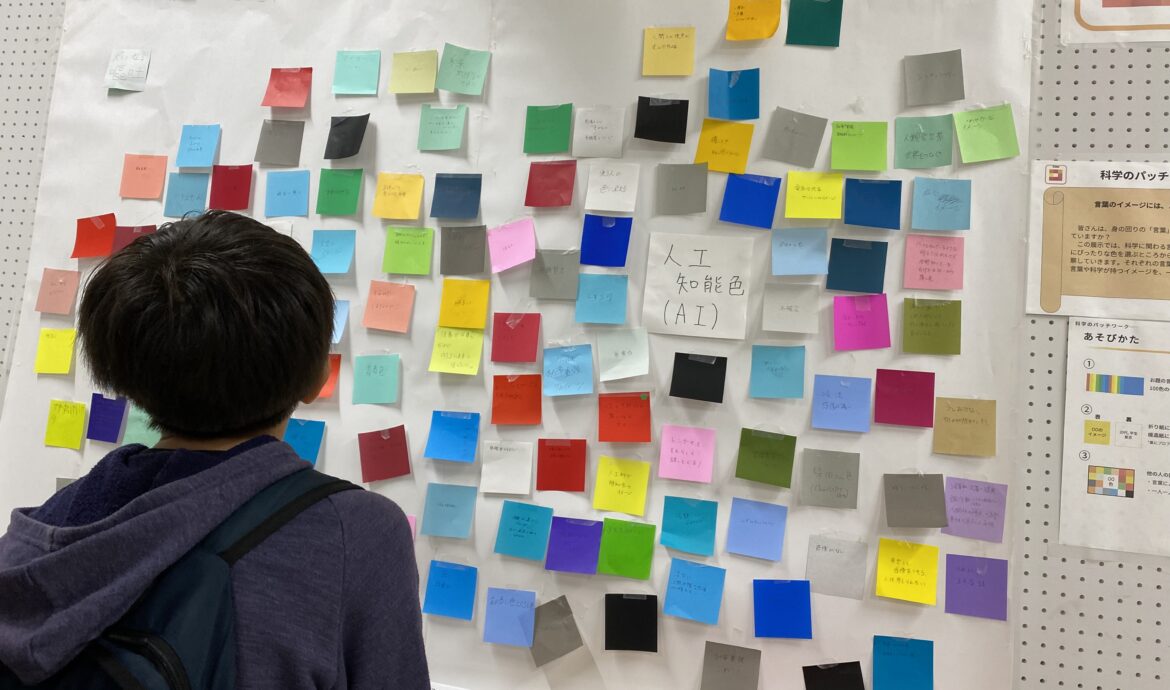
Reportage: A new trial for science communication from a student association in Japan
Climate Change . SocietyFull of people in a classroom, they were writing their opinions down on worksheets, talking with staff, and enjoying reading what other people wrote.

In each section, a question is written. “What will technology offer us? How will we treat technology?” “How do we create common sense?” “How do word choices affect our way of understanding toward social issues? — Ten questions, ten sections are here.
In one of the sections, titled “Who shares “the common sense”?” a staff member, actually the author of this article, talked with a visitor writing her worksheet.
“So you [the visitor] believe it is natural that we must treat everyone in a fair and equal manner in public, right? Why?”
“Because things must be like that…”
“Why do you [the visitor] think things must be like that?”
“Hmm good question… I believe, treating everyone in that way is necessary to secure everyone’s safety and human rights.”
“Cool. Then let’s think about it; why do we need to secure everyone’s safety and human rights?”
And the discussion continued for a while.

This is what the student association UTaTané in the School Festival is like.
At UTaTané, members create “exhibitions” that ask questions to the visitors at the School Festival of a Japanese University and an event on science communication. They sometimes cooperate with other associations and organize events.
Members try to make sure that the visitors can easily join the exhibitions and think about the questions in the exhibition.
Many of the exhibitions ask visitors to write down their ideas about the question on the worksheets. The worksheets are displayed on a big poster after visitors write them down so that visitors can develop and create the exhibition together.
They spend 3 months or longer creating exhibitions, modifying many times their worksheet and the design of exhibitions.
As the author created one exhibition “Who shares “the common senses”? ”, the author created worksheets three times with advice from other members. The author needed to be careful with design and word choice because even a modification of one word can change the engagement of visitors.

What do you think about what visitors thought about the themes?
UTaTané is the student association whose theme is “ to design and practice the new way of “communication” of science”.
“Nowadays sciences and academic knowledge are needed in society in a more varied and more complicated way than ever.”
Tae Kato, a Japanese student majoring in STS (Science and Technology Studies / Science, Technology and Society) who also works as the manager of UTaTané, said.
The Japanese experienced the destruction of a safety myth of nuclear power from Fukushima, the COVID-19 pandemic, and ongoing environmental problems. These incidents require not only politicians or scientists but also citizens to think, discuss, and make a decision on scientific problems. Kato insisted that we need to change the way we communicate in science.
Also, she explained how the UTaTané’s trials can be valuable in recent situations.
“Our exhibitions can be opportunities for people with diverse values to discuss together and think together. We are always struggling to create exhibitions that allow visitors to enjoy engaging and thinking.”

One of the notable features of UTaTané’s way of communication is that they focus on asking “questions” that cannot easily be answered, and they never end up just teaching scientific knowledge nor conveying fascination with science.
Yuki Kubota, an establisher of UTaTané and now working as a researcher, described how UTaTané came to do this type of activities.
“Before I established UTaTané, I engaged in another student association for science communication, which aims to tell children the attractiveness of science. However, I came to realize that there are more ways of science communication.”
He said that at first UTaTané tried to show visitors how the scientists’ research can contribute to our daily lives. However, as he continued his activity both in UTaTané and the other student association, he began to treat the issues related to science and society.
There are some more that UTaTané has a basic philosophy of; one of the things is that they value letting members do what they find interesting.
During the three months of creating exhibitions, Kato repeatedly told the idea to members that they should explore thoroughly what each of them is interested in.
The author felt the other UTaTané members helped her enough when she created the exhibition “Who shares “the common sense”?”
“At first I even didn’t know what I wanted to talk about with visitors, what I wanted to express through the exhibition. I believe many UTaTané members were in the same situation. It was exciting, however, to figure out what I was interested in and then to create the exhibition by discussing with other members and getting their advice.”
She continued; “The exhibition offered me a really precious opportunity to talk with and think together with many people about what I’ve been interested in. How exciting it was!”
*Pictures in this blog are provided by UTaTané with permission.